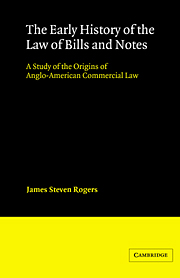 The Early History of the Law of Bills and Notes
The Early History of the Law of Bills and Notes Published online by Cambridge University Press: 22 September 2009
To understand the development of the law of bills, one must begin by considering how merchants actually used bills in early commerce and what issues of economic and social policy were raised by the transactions in which bills were used. The key to that inquiry is to begin not with bills themselves, but with the exchange transactions in which bills were used.
EXCHANGE TRANSACTIONS AS MEANS OF FUNDS TRANSFER
Accustomed as we now are to highly developed systems of communications and shipping, and specialized institutions for the settlement of financial transactions, it is easy to overlook how different the task of the merchant was in the era preceding all such developments. The French historian Fernand Braudel has pointed out that the problem of making returns is inherent in any form of trade. ‘Since exchange by definition means reciprocity, any journey from A to B must be balanced by a return journey – however complicated and roundabout – from B to A. The round trip, once complete, forms a circuit. Trade circuits are like electrical circuits: they work only when the connection is unbroken.’ In the modern world, the problem of ‘making returns’ is a macro-economic phenomenon ordinarily discussed only at the level of statistical measures of the aggregate flow of trade among nations or regions. In earlier times, the problem of making returns was a direct and immediate concern for every individual merchant.
In the earliest form of trade organization, making returns meant simply carrying back the fruits of one's trading journeys.
To save this book to your Kindle, first ensure [email protected] is added to your Approved Personal Document E-mail List under your Personal Document Settings on the Manage Your Content and Devices page of your Amazon account. Then enter the ‘name’ part of your Kindle email address below. Find out more about saving to your Kindle.
Note you can select to save to either the @free.kindle.com or @kindle.com variations. ‘@free.kindle.com’ emails are free but can only be saved to your device when it is connected to wi-fi. ‘@kindle.com’ emails can be delivered even when you are not connected to wi-fi, but note that service fees apply.
Find out more about the Kindle Personal Document Service.
To save content items to your account, please confirm that you agree to abide by our usage policies. If this is the first time you use this feature, you will be asked to authorise Cambridge Core to connect with your account. Find out more about saving content to Dropbox.
To save content items to your account, please confirm that you agree to abide by our usage policies. If this is the first time you use this feature, you will be asked to authorise Cambridge Core to connect with your account. Find out more about saving content to Google Drive.